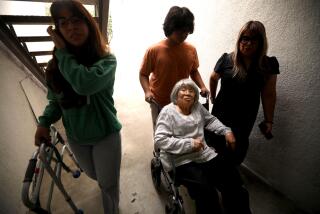Retarded Children Can Fortify Family
- Share via
COLT’S NECK, N.J. -- A few weeks after her second daughter was born, Carole Ehlinger received a card from longtime friends. The gist of the message: “You’re so lucky.”
Struggling to absorb the fact that her newborn had Down syndrome, Ehlinger found the card perplexing -- although not for long.
“I didn’t understand right away, but that message has really rung true,” Ehlinger said. “Catherine has brought out the best in all of us.”
Catherine is 23 now, a high school graduate with a boyfriend, working three afternoons a week bagging groceries at a supermarket. Adult and independent in many ways, trustingly childlike in others, she has -- like other young people with mental disabilities -- provided her parents with a distinctive set of challenges and joys.
“I remember coming home from the hospital and looking at the comics in the paper and thinking, ‘I’ll never be able to laugh again, “ Ehlinger recalled. “If only I’d known how wonderful it was going to be.”
In the span of one generation, the dynamics of families like the Ehlingers have been transformed as the life expectancy of people with Down syndrome -- the most common form of mental retardation -- increased from 25 years to more than 50.
Parents no longer assume that they will outlive their child, and the option of mental institutions has fallen from favor. Parents and child often spend many more years together than in the past, and parents face difficult decisions about encouraging self-reliance and ensuring a grown child’s well-being after their death.
For Carole Ehlinger and her husband, Jim, an executive with AT&T; Corp., concerns about the future are eased somewhat by their expectation that Catherine’s siblings -- Christine and James -- could keep an eye on her.
The future has more question marks for others.
Maureen Maimone’s 17-year-old son, J.C., also has Down syndrome, but he is an only child. Maimone worries about what might happen if she dies before he does.
“I have such a profound fear about when I’m not here any more,” she said. “Who’s going to think about where he’ll go for Thanksgiving? Who’s going to know he’s afraid of thunderstorms?”
Divorced when J.C. was 5, Maimone has been her son’s constant companion since his birth. Aside from one 10-day separation many years ago, when she attended a meeting in Hawaii, they haven’t been apart more than three days. She wants to encourage his sense of self-sufficiency, but knows not to push too fast.
“He’s extremely friendly; he talks to strangers,” she said at their home in Ocean, N.J. “I try to teach him to be cautious, but not make him fearful.”
J.C. attends regular classes at the local high school; he also takes special math and reading courses.
“J.C. is very popular in school,” his mother said. “Unfortunately, it doesn’t carry over to the weekends. His schoolmates aren’t going to call.”
The result is that Maimone, 46, and her longtime partner, 59-year-old lawyer Andy Kimmel, are J.C.’s weekend playmates -- a role they find rejuvenating. They go to concerts, play mini-golf, travel -- railroad museums are among J.C.’s favorite destinations.
“The challenge is getting our energy level up,” Maimone said. “We’re usually on the go all weekend. Sometimes we’re pooped, and all three of us just hang out in the bookstore.”
Maimone grew up in a large family and wishes that J.C. could have the same opportunity.
“Sometimes I think his biggest disability is being an only child,” she said. “I have the finances and the time to do what I want to do with him, but he doesn’t have the other stimulation. I wish he had a brother or sister to tease him, play with him.”
Maimone recalled being stunned, after J.C.’s birth, at learning he had Down syndrome.
“There was no history of it in our families,” she said. “We thought, ‘He’s not ours. It’s a mistake.’ It was the initial shock, and then ‘Let’s roll up our sleeves and learn about it.’ ”
She read advice books, contacted experts, founded a support group. Her life -- which includes some part-time legal work done from home -- has been demanding but rewarding.
“I have those moments where I see that it’s different here, that most parents don’t have to do all this,” she said. “But I truly think that’s a small price to pay for what I’ve gotten back from him. If there’s any kind of plus-minus scale, it’s 1,000 times on the plus side.”
On most Saturdays, J.C. gets a visit from his biological father, who takes him to drum lessons. The role of day-to-day father is embraced zestfully by Kimmel, who like Maimone is divorced. He says his relationship with J.C. is more intense than with his two grown children.
“I love them dearly, but it’s not the same thing,” Kimmel said. “J.C. is an extraordinary person.”
With Kimmel’s help, Maimone is now looking ahead, talking about vocational training and future living arrangements for J.C., and about estate planning.
“Who wants to think about these things? But you have to,” Maimone said. “If you don’t make plans, they just get dumped somewhere.”
She envisions her son getting a job after high school and eventually moving into an assisted-living facility where he could be more independent.
“I’d love to have him live with me forever -- but I’d like him settled somewhere before anything happens to me,” Maimone said. “By his late 20s, I’d like to see him living somewhere on his own -- definitely nearby -- maybe a mile down the road.”
J.C. -- a strong swimmer, self-taught harmonica player and fan of actor Jackie Chan -- has his own ideas about the future. “I’m going to get married,” he said. “I’m going to drive a black VW bug.”
But if those are typical sentiments of a 17-year-old boy, his affection for his best friend is not. “You’re the best mom ever,” he told Maimone, hugging her as she picked him up at day camp. “You’re my pumpkin.”
The Maimones and Ehlingers live about 12 miles apart in the pleasant, farm-dotted suburbs near New Jersey’s northern coast. Both have become active in programs for young people with disabilities.
When Catherine was 2, Carole Ehlinger founded a dance group for her and other children with disabilities. The group has prospered ever since, with help from the entire Ehlinger family. Catherine has taught some of the youngest dancers; siblings Christine and James were volunteer teachers, and Jim has videotaped some performances.
James, 19, has been a devoted brother to Catherine. They helped each other learn to read when she was 6 and he was 2. More recently, he and some friends coached Catherine’s Special Olympics basketball team.
With James entering the University of Notre Dame this fall and Christine, 25, living an hour’s drive away, Carole and Jim Ehlinger are in no hurry for Catherine to leave home -- she needs them.
“We’ve chosen to take things as they come,” Ehlinger said. “For all your children, your goal is for them to go off and have wonderful, independent lives. For Catherine, it’s a little tricky. She needs someone to oversee her.”
Some experts advocate independent living for people like Catherine, “but it doesn’t really ring true to us right now,” her father said. “We enjoy having her here. She brings a lot to the family.”
If Catherine did live independently, she would need help with cooking, transportation (she can’t drive) and finances, her parents said.
“She’s very trusting, and someone could take advantage of her,” Jim Ehlinger said. “But we’ve been fortunate. Despite what you read in the newspapers, there are more people who are basically good than bad.”
Carole Ehlinger long ago gave up teaching to rear her children, and her husband has turned down offers of transfers. One factor, he said, was a sense that Catherine benefited from close ties to friends she has known since infancy in New Jersey.
Catherine’s life has been full of milestones, including graduation from high school two years ago and serving as her sister’s maid of honor in October. The Ehlingers proudly showed the videotape of Catherine’s speech at the wedding reception.
“I love you guys,” Catherine told the newlyweds, her voice full of emotion. “I want you guys to stay together forever.”
The guests cheered, and Christine rose from her table to bear-hug her sister.
When Catherine was born, her mother recalled, a well-meaning doctor tried to caution the parents that her horizons were limited -- that at 16 she’d perhaps be preoccupied with coloring books.
“That was the mind-set at the time -- don’t have high expectations,” Carole Ehlinger said.
Instead, Catherine has been a pivotal part of a loving, on-the-go family -- the one most attuned to others’ ups and downs, the one most certain to remember an anniversary or birthday.
“She’s been such a positive element in our lives,” her mother said. “I think every family should have a child with Down syndrome.”
More to Read
Sign up for Essential California
The most important California stories and recommendations in your inbox every morning.
You may occasionally receive promotional content from the Los Angeles Times.













